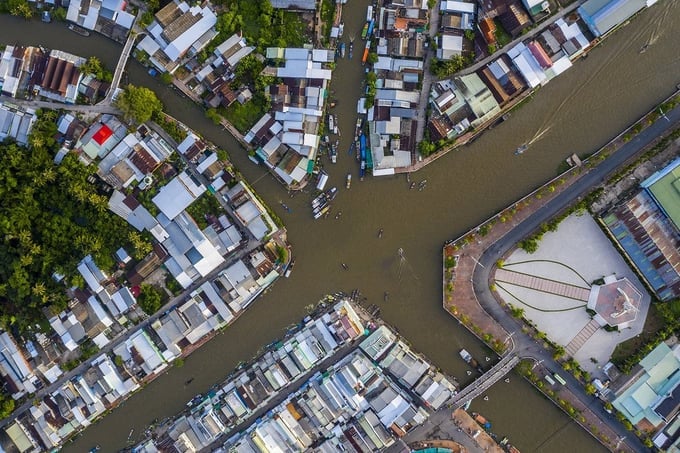November 25, 2025 | 05:20 GMT +7
November 25, 2025 | 05:20 GMT +7
Hotline: 0913.378.918
November 25, 2025 | 05:20 GMT +7
Hotline: 0913.378.918

The upgrade of the East-West transport corridor is expected to reduce the transport distance between the largest port in the Mekong Delta region in Can Tho and Vietnam’s busiest port in Ho Chi Minh city by approximately 30%. Photo: TL.
The recently approved project for developing waterways and logistics corridors in the southern region of Vietnam aims to increase cargo volume and reduce transit time on the critical East-West and North-South transport corridors. The project will also connect key production centers with Vietnam’s main deep-water port, thereby enhancing export competitiveness.
According to Mariam Sherman, World Bank Country Director for Vietnam, Cambodia, and Laos, the inland waterways in southern Vietnam possess the potential to become a cheaper, greener, and safer mode of transport. This project directly supports Vietnam’s ambitious goals of promoting the competitiveness of inland waterway transport, reducing carbon emissions in the transportation sector, and boosting the country’s trade competitiveness.
The upgrade of the East-West transport corridor is expected to reduce the transport distance between the largest port in the Mekong Delta region in Can Tho and Vietnam’s busiest port in Ho Chi Minh city by approximately 30%. Additionally, the improvement of the North-South transport corridor will directly connect the Mekong Delta and inland areas with Vietnam’s main deep-water port, thereby facilitating international trade, reducing emissions, and lowering logistics costs.
On the other hand, the transition to inland waterway freight transport is crucial for reducing carbon emissions in Vietnam’s transportation sector. Road freight transport accounts for nearly 80% of greenhouse gas emissions within the sector, which is at least six times more carbon than waterway transport.
The southern waterways and logistics corridor development project also supports the installation of navigation aids and the improvement of sharp bends along the waterways, with the goal of enhancing safety. The project is expected to benefit agricultural producers, businesses, workers, vessel operators, and the local community in southern Vietnam.
Translated by Nguyen Hai Long

(VAN) Green transition is crucial for the Mekong Delta amid climate change and stricter standards, offering a path toward sustainability.

(VAN) Dong Thap promotes agricultural restructuring, forms large specialized farming zones, raises the value of agricultural products and develops toward ecological and high-tech directions.
/2025/11/22/4018-4-213342_747.jpg)
(VAN) The Mekong Delta Agricultural Experts Club has attracted 143 experts and researchers to participate in providing consultancy and contributing initiatives to the development of one million hectares of high-quality rice.

(VAN) Ca Mau’s development of OCOP products opens a path to increasing cooperatives value, helping boost income, expand markets, and affirm collective economy's role.

(VAN) Turning seemingly ordinary coconut shells into unique jewelry and artwork, Nguyen Bang Nhi spreads the value of local culture through her brand, Cocohand.

(VAN) Results from the Sustainable Durian Model Project in Dak Lak have confirmed the critical role of Yara Viet Nam in transferring advanced nutritional solutions to farmers.

(VAN) In Tuyen Quang province, livestock farmers have introduced effective models and innovative practices that significantly strengthen African Swine Fever prevention and control efforts.